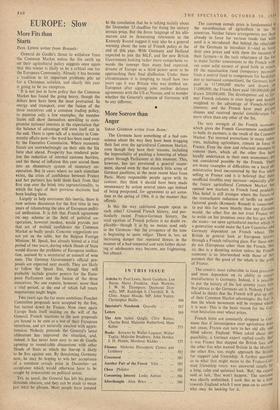More Sorrow than Anger
SARAH GAINHAM writes from Bonn: The Germans have something of a bad con- science about the way they have been dragging their feet over the agricultural Common Market, even though they have their reasons, including the impossibility of pushing a lowering of wheat prices through parliament at this moment. This, however, has not prevented a general resent- ment, shared even by that staunch little army of German gaullistes, at the most recent blast from Paris. Many responsible people agree with its content; they think it should have been made unnecessary by action several years ago instead of being postponed, for agreement to act some- time in the spring of 1966. It is the manner that offends.
Is this the way, cultiVated people speak to each other? Granted French history, and par- ticularly recent Franco-German history, the total egotism of French policies is no doubt ex- plicable—though it is .by no means used only to the Germans—but the., arrogance of the tone is beginning to seem vulgar. There is, too, an increasing danger that repeated threats in the manner of a bad-tempered and vain father shout- ing at adolescents may become, not frightening, 'but absurd. The common cereals price is fundamental to the co-ordination of agriculture in the Sit countries. Neither future arrangements nor those already in force for various foods can work until it is introduced. But behind the reluctance of the Germans to introduce it—and so lower their own prices and with them the incomes of their farmers—is the tacit reluctance of the five to, make further concessions to the French v,lth' out some solid earnest of good faith in Nairn. Of the equalisation fund (temporary payments from a central fund to compensate for hardshiPs due to increased competition), the Germans have paid in 117,000,000 marks and drawn on b,000,000; the French have paid 100,000.000 and -drawn 260,000,000. The development aid to for" mer French colonies is even larger and heavily weighted to the advantage of French-Africa" interests; and the French have used get-Pat clauses and received special consideration 1.3r more often than any other of the Six.
The very strength of the French econorn)', which gives the French Government confidence to bully its partners, is the result of the Common Market. Yet internal protections in many indas" tries, including agriculture, remain in force in France. Even the slow and reluctant attempts 'to remove them, which all the other five have loyally undertaken in their own economies, are not considered possible by the French. There are many examples of difficulties on a local ad' ministrative level encountered by the five when selling in France and it is believed that these unofficial troubles may increase--especially after the future agricultural Common Market has opened new markets to French food products. This belief is still stronger where the future of the transatlantic reduction of tariffs on manik factured goods (Kennedy Round) is concerned; to put this far more bluntly than any German would, the other five do not trust France n' to welsh on her promises once she has got what she wants—an open agricultural market which in a generation would make the Low Countries and Germany dependent on French wheat. The British in general look at European history through a French refracting glass. For those who do not (Europeans other than the French, that is), this is a daunting notion unless the French economy is so intermeshed with those of her partners that the good of the whole is the good of France.
The country most vulnerable to food pressures and most dependent on its ability to export manufactures is Germany. Indeed, it is possible to put the history of the last seventy years into that phrase as the Germans see it. Nobody I have talked to thinks that the French will give up any of their Common Market advantages; the fear is that the whole movement will be stopped where it is now. This is the basic reason for the (icr' man hesitation over wheat prices.
French hints are constantly dropped to (ice" mans that if intransigence over agriculture does not cease, France can turn to her old ally and blind adorer, England. When asked about this possibility, a German expert replied coolly that it was France that slapped the British face and the other five who wanted Britain in the Market; the other five, too, might approach the British for support' and friendship. A further question as to what that might mean to the Franco-Ger- man friendship treaty was answered simply by a long, calm and quizzical look. 'But,' the exPert said at last, 'that won't happen.' The sentence was clearly unfinished. I took this to be a hint towards England which I now' pass on to anyone who may be looking for it.


































 Previous page
Previous page